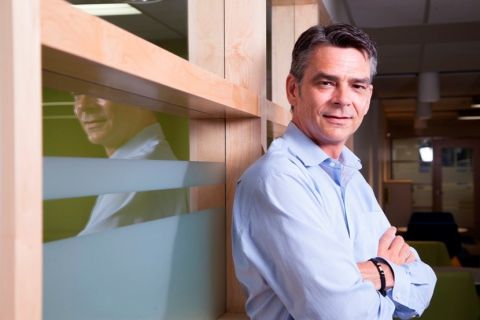
Canada and most other countries have a hard time convicting people involved in offshore tax evasion and international money laundering. Professor Art Cockfield, Law’93, of Queen’s Law and Professor Christian Leuprecht of RMC and Queen's Political Science are working to change that. Armed with a $153,000 research grant and assisted by students and an innovative tool, they’re digging into the hidden financial underworld.
“We’re compiling facts from case law involving global financial crimes,” says Cockfield. “Then we’ll discern patterns for these crimes, which will help governments detect, investigate and arrest criminals.”
Cockfield first got involved in this area of research in 2012, when the CBC hired him as a consultant to examine the world’s first tax haven data leak called Offshore Secrets (he also looked through the Panama Papers, which were revealed to the public in 2016). “This changed the arc of my research career,” he says. “For the first time, I got a sense that there was a lot of crime happening in the offshore world. As I sifted through the leak, I had a better sense of what crooks were doing: engaging in global financial crimes like offshore tax evasion and international money laundering.
“Tax haven data leaks like the Panama Papers suggest such criminal practices by high net-worth individuals and families are actually quite widespread all around the world,” he adds.
How does someone get away with offshore tax evasion?
“Let’s say there’s a Canadian billionaire who has a family fortune of $1 billion and hides $400 million in a tax haven (an offshore country that doesn’t charge foreigners any tax),” says Cockfield, giving an example. “The money could have been an inheritance or earned legally. The billionaire could have filled suitcases with cash, flown to the Bahamas, put the cash in a Royal Bank account in Nassau, and then invested the money in Eurobonds. The money just accumulates there, but the billionaire doesn’t report the interest income on his tax return to the Canada Revenue Agency, so Canada doesn’t receive any tax revenue for it.”
How can one get away with international money laundering?
Cockfield explains how it works using Canada’s fentanyl crisis as an example. “Over 90 per cent of the illegal fentanyl sold to Canadians is produced in Chinese labs, so the original illicit narcotic gets manufactured in a foreign country, is sold over the Internet to dealers (like Chinese mob members) or users in Canada, and all that ‘dirty money’ ends up in our country,” he says.
But all the money collected from the sale of these illicit drugs must get back to the country that produced them. To do that, the dirty money must first be ‘cleaned.’ “A drug dealer could use the dirty money to buy a $20-million mansion in Vancouver,” he explains. “Suddenly the dealer has invested money in a ‘clean asset,’ which can then be sold. Another common tactic to clean up the money is to buy casino chips with the dirty money, gamble a little bit, and then cash out your casino chips at the end of the night.”
Terrorist financing, yet another crime Cockfield has been researching, was the subject of a paper he and Leuprecht presented at the University of Hawaii Fulbright Conference five years ago.
“Since then, we’ve worked together on different global financial crime projects, and we thought we could come up with a new approach to help understand these pressing social problems,” says Cockfield.
The Social Sciences and Humanities Research Council of Canada is providing funding for them to do just that. They were awarded a five-year SSHRC Insight Development Grant for their new project, “Invisible Underworld: Inhibiting Global Financial Crime.”
In addition to communicating their forthcoming research results with their scholarly peers and advancing knowledge about these crimes, another purpose for this work, Cockfield says, “is to devise optimal laws and policies that will allow law enforcement to investigate and arrest financial criminals and terrorist financiers.”
To get started, Cockfield and Leuprecht hired research assistants, including Kasia MacNaughton, one of Cockfield’s PhD students, and JD students. The research assistants are gathering facts from case law involving offshore tax evasion, international money laundering and terrorist financing.
“Part of our research involves sifting through all the world’s existing judicial decisions surrounding global financial crime that we can access in English,” says Cockfield. “Then we are coding data like the plaintiff’s name, the bank they are using, the country the bank is located in, and so on. From there, we apply Social Network Analysis (SNA), a social science tool that uses computer analysis of data to discern patterns. We’re trying to figure out patterns surrounding global financial crime.”
SNA was developed by Leuprecht, with colleagues at Queen’s and elsewhere a few years ago. It’s so new that it’s been rarely applied in any context. But Cockfield and Leuprecht have already used it for an article, “Tracking Transnational Terrorist Resourcing Nodes and Networks,” published in the Winter 2019 issue of the Florida State University Law Review. For their work in that area, they had received two grants from the Canadian Network for Research on Terrorism, Security and Society.
For their new project, Cockfield and Leuprecht are working on a paper and organizing a conference to take place next June in Ottawa, where the world’s leading experts will gather to study and exchange information. The two collaborators will also be writing at least one book.
Once the Canadian and other governments are armed with the results of Cockfield’s and Leuprecht’s latest research project, they’ll also be able to make it more difficult for people to get away with global financial crimes.
By Lisa Graham